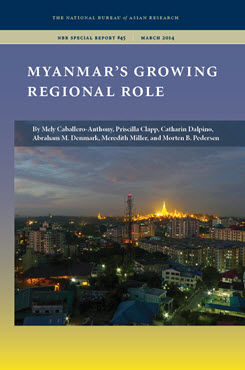The Influence of Domestic Issues on Myanmar's Foreign Policy
A Historical Perspective
This essay is part of the report “Myanmar’s Growing Regional Role,” which explores the issues surrounding Myanmar’s re-emergence as a regional power and outline implications for U.S. policy in relation to Myanmar and Southeast Asia as a whole.
EXECUTIVE SUMMARY
This essay describes the influence of internal events and circumstances on Myanmar’s foreign policy and external relations from the end of the colonial period to present.
MAIN ARGUMENT
Emerging from colonial rule as a battleground in World War II, Myanmar soon found itself buffeted by Cold War power struggles between Communist giants and East and West. To avoid being drawn into the turmoil, the fledgling democracy of the 1950s adopted a foreign policy of strict neutrality and nonalignment. Consumed by internal insurgencies on several fronts, Myanmar slid into a harsh form of military rule after 1962 and closed its doors to isolate itself from the post-independence struggles besieging the neighborhood. After the events of 1988, the military rulers tried to end their self-imposed isolation, but Western countries began applying political and economic sanctions that effectively perpetuated isolation for another twenty years. In response, the military government adopted a defensive foreign policy using its neighbors, especially other members of the Association of Southeast Asian Nations (ASEAN) and China, as a buffer against a Western attack. When the transition to a quasi-elected government in 2011 suddenly spawned a dramatic succession of political and economic reforms, the waves of international opprobrium ceased. Myanmar now finds itself in the embrace of the international community and is gradually adjusting to its newfound status.
POLICY IMPLICATIONS
- Myanmar’s foreign policy will remain consistently neutral and nonaligned, although the country will inevitably become increasingly bound to its Southeast Asian neighbors as ASEAN realizes its post-2015 goal of the ASEAN Economic Community.
- The failure to confront communal violence against Muslims could seriously complicate Myanmar’s relations with Muslim countries in Asia and elsewhere.
- While the current government is clearly vested in the democratic reform process, the sustainability of reforms beyond 2015 will depend vitally on the government’s ability to deliver a higher standard of living to the general population, as well as its success in delivering peace, prosperity, and equality to the country’s peripheries.


